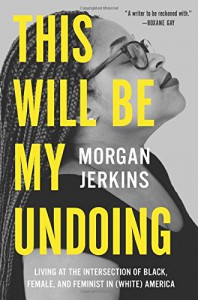"So it goes."
Ella Mc's book blog. Brand new 2018 - Only books read after 1st January 2018
Morgan Jerkins This Will Be My Undoing

I had a hard time with this book of essays, and I know this is an unpopular view.This is a worrying book about young black women and younger women in general. Where did all the work done by previous generations of black women go? Why is this young woman so scared, confused and unprepared for real life? Why is she so ready to feel victimized and unable to express much beyond anger? Where is her agency? Jerkins' unpreparedness is upsetting given the time in which she grew up. Where she chooses to put her anger seems...flailing, at best. If this is the state of young, highly eductaed and smart black women in 2018, there is much too much work to be done. I think that, actually, is her point, but her angle on blame - everyone but herself - feels unthinking often and irrational sometimes.
There are too many moments in this book when you can feel her anger spilling onto anyone instead of herself and her immediate family, who prepared her for adulthood by telling her dating older men would make her a heroin addict and give her AIDS. There is a combination of religious unwillingness to see the truth and very reasonable anger at current situations that constantly beat up against each other in this collection of essays (loosely arranged as a sort of memoir.)
I wanted this book to have a conversation with parts of Roxane Gay's Bad Feminist, which comes just a few short years before this book but between the two collections, a reader feels the difference between justifiable and just anger from a woman of agency (Gay) turn to a mass of vitriol and victimhood. The women are different in many ways, but the way they handle life in their essays seems almost at direct odds sometimes, and well, I guess I feel more inclined to see the gray areas, like Gay so perfectly navigates in Bad Feminist. Instead this book is very right/wrong, yes/no, good/bad, evil/perfect. Everyone feels that way sometimes, but this is supposed to be a book of thoughtful essays, which seems like it should be different from when I have a bad day and call up my girls to bitch.
While I would never say anyone's pain is not warranted or allowed, some of Jerkins' pain seems to be a direct result of fanciful dreams and unrealistic expectations combined with a strict religious upbringing and parents who say things like speaking to an older man is how you get raped and addicted to heroin (seriously - it's not a joke.) So, she's angry - and she has a right to be. But perhaps some of her anger might be pointed at the people who underprepared her for everything from her sexuality to dating to her clear intellect rather than racial or gender animus. She's perfectly free and easy writing about her vagina in painstaking detail, but she doesn't take any of her preconceptions to task as much as she does her physical self. In consistently placing herself as the victim of nearly every single essay, a reader could wonder "where on earth has a woman's agency gone?" And why is she so invested in constantly being someone or something else's victim?
Of course women should be safer riding the subway or walking the city. Of course black women shouldn't be painted with wide brushes and put into boxes, or as Zadie Smith says so eloquently in her book of essays this year, black bodies shouldn't be fetishized. There is an assumption between many lines that Jerkins (with her dreams of marriage by 22, college as husband-finding-factory, strong intellect, individual voice and humanness of many facets - like everyone) has nothing to do with the outcomes she receives. That is, perhaps, the blindness of youth. But if youth is blind, then maybe it shouldn't assume that everyone's situation is exactly the same or that everyone else is the problem. And maybe a better editor would have made this a much stronger book, one that showed something beyond the black woman as willing victim to her own choices and everyone else's.




